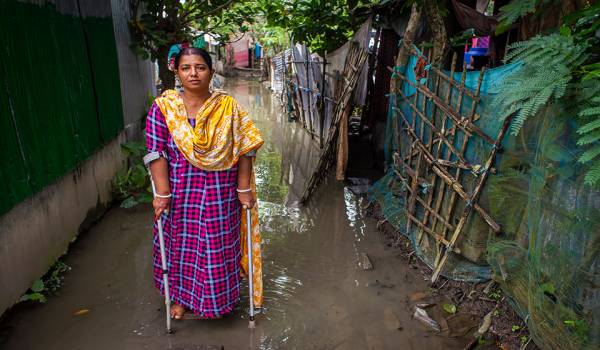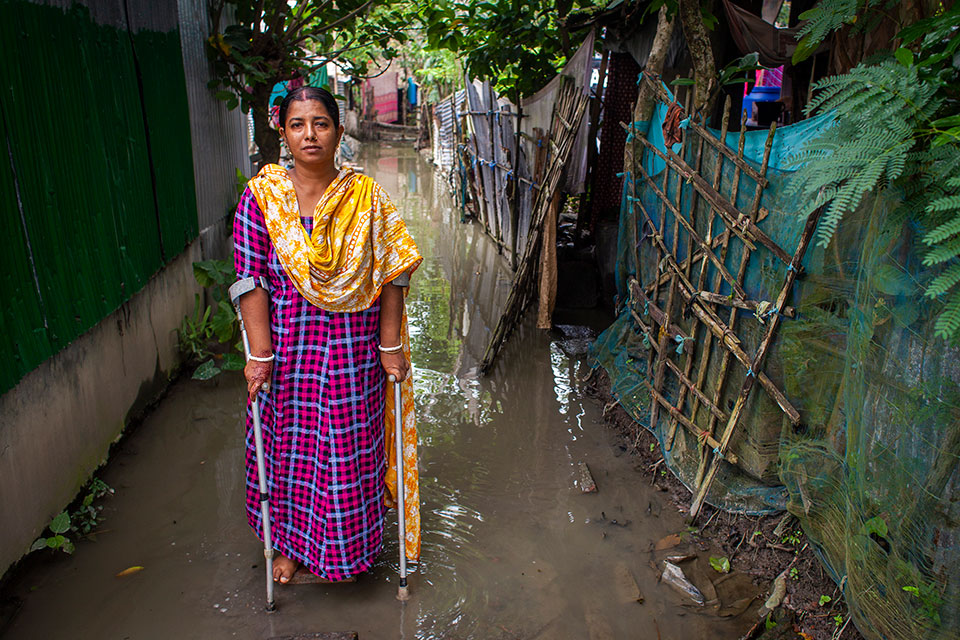
In a post post-disaster scenario, reaching cash in the hands of women, at the right time, makes family’s and community’s recovery efficient and faster; that’s what we, at UN Women Bangladesh Country Office, have been trying to do for the last few years.
— Dilruba Haider, UN Women Programme Specialist in Bangladesh
A key element of this is the availability of finance. Less than 60 per cent of Bangladeshi women have access to credit—a consequence of entrenched institutional, cultural and social barriers. As a result, female entrepreneurs are often forced to seek out informal financial markets or rely on profiteering middlemen.
Additionally, just over a third of Bangladesh’s labour force is female, with a tiny proportion—less than five per cent—holding a formal role. On average, women earn 21 per cent less than their male counterparts.
The humanitarian crisis triggered by COVID-19 has only complicated matters, putting vulnerable women even further behind—as was the case for Sunita Roy.
Like a majority of Bangladeshi women, Roy married young. Pregnancy followed soon after the wedding, and her life took a sudden, traumatic turn. Abandoned by her husband before the baby’s arrival, she was left paralysed from the waist down during childbirth.
In the years that followed, she strove to support her daughter and elderly mother, taking on low-paid roles and borrowing from neighbours when necessary. In time, those neighbours would become her customers, buying clothes she made with a sewing machine supplied by the Association for Social Development & Distressed Welfare (ASDDW), a local women-led civil society organization.
A talented seamstress, Roy turned her focus to more profitable products—garlands and fabric flowers—which she sold at weddings and festivals. With a steady income, things were looking up for the 36-year-old. And then coronavirus hit.
Image

Sunita Roy, 40, lives in Chalna at Dacope upazila in Khulna. She lost work and income due to the COVID-19 pandemic before her family’s home was damaged by Cyclone Amphan in 2020. Photo: UN Women/Fahad Kaizer
“With the countrywide closure during COVID-19, my business came to a halt”, says Roy, who lives in a rural region of southwest Bangladesh. “My savings ran out, and I couldn’t purchase food and other necessary commodities”.
At this low point, ASDDW again stepped in. With emergency funding supplied by UN Women, the group was able to sustain Roy during lockdown, providing a cash grant of 3,000 Bangladeshi taka (USD 34). Now, as the threat of the virus wanes, she’s investing that money in her family’s future.
“I spent part of the [grant] to buy food, and with the rest I purchased some raw materials to produce my product”, she says. “My business has become a little bit bigger, my income has increased, and it’s now well enough to support my family”.
UN Women works with dozens of civil society and local women’s organizations to address these systemic issues, improving access to financial resources, training and employment opportunities. For ASDDW, a group that’s long struggled to secure government funding, this assistance is essential.
“Being a local level civil society organization, we lack capacity to mobilize funds”, explains Lipika Bairagi, ASDDW’s CEO. “UN Women has helped with this, as well as building our communication, project execution, and development capacity”.